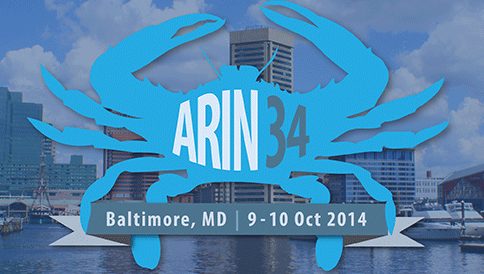 Next week is the ARIN 36 meeting in Montreal. Here is my look ahead at the some of the policies being discussed at the meetings. There are two recommended drafts that will be discussed along with nine other draft policies. If you aren’t going to be there in person check out the remote participation options.
Next week is the ARIN 36 meeting in Montreal. Here is my look ahead at the some of the policies being discussed at the meetings. There are two recommended drafts that will be discussed along with nine other draft policies. If you aren’t going to be there in person check out the remote participation options.
2015-1 IPv6 Initial End-User Assignments (Recommended Draft)
Policy Summary: This recommended draft policy allows organizations which have 13 different sites to qualify for an /40 IPv6 block.
Discussion: This policy is intended to aid the widespread adoption and stabilization of IPv6 by allowing small organizations to obtain a permanent block of IPv6 addresses rather than having to obtain a block from their upstream provider. There has been little opposition to this policy change and I expect it to move forward to Last-Call.
2015-4 Modify 8.2 section to better reflect how ARIN handles reorganizations (Recommended Draft)
Policy Summary: This recommended draft policy clarifies existing staff practice regarding reorganizations. It explicitly notes that a needs-test is not required for reorganizations.
Discussion: This policy was created by the AC after a Policy Experience Report noted that the current policy is causing some confusion by the membership. The AC originally consider this as a possible editorial change, but decided that it was best to put this policy through the entire policy process. There has been no opposition to this codification of existing practice. I expect this policy to move forward to Last-Call.
2014-14 Remove Needs Test on Small Transfers
2014-14 Policy Summary: This draft policy removes needs testing from blocks which are smaller than /20 and permits an organization to have one needs-free transfer per year as long as a corporate officer attests to the organizations need of the addresses.
Discussion: This policy was rewritten extensively, largely by myself, with input from members of the AC. When the policy was returned to the list the new text seems to have fallen flat without much discussion. In my mind this means I have crafted text that now appeals to very few because it makes great compromises between the two sides of the argument for and against needs testing in the transfer market, or people don’t think this type of policy will solve the problems that exist in the current transfer market. I suspect this policy will likely be abandoned by the AC following the meeting. Hopefully, at least we have a robust discussion about what types of policy changes are needed as ARIN moves to mostly processing transfers rather than issuing addresses from the IPv4 free pool.
2015-2 Inter-RIR Transfers to Specified Recipients
Policy Summary: This policy allows an organization which receives a transfer in the ARIN region to transfer it to another RIR within 24 months of receiving the transfer.
Discussion: The policy is intended to benefit large organizations which receive a block via transfer in the ARIN region and then want to transfer it to a subsidiary or other entity in another region. (There is however no restriction in the existing text that it be a subsidiary.) Some have not supported this policy as it is a “workaround” for broken geolocation issues. Furthermore some have opposed this as they see potential for increased address market speculation.
2015-3 Remove 30 day utilization requirement in end-user IPv4 policy
Policy Summary: This draft policy remove the 30 day usages requirement for IPv4 end-users.
Discussion: This policy is intended to remove what has been considered an onerous requirement on end-users. Under current policy an end-users is supposed to put 25% of their block into use with 30 days, based upon a 1 year allocation. This requirement has always been very hard for organizations to meet and has skewed the allocation sizes downward. With end-users now forced to obtain assignments via the transfer market, this policy provision is much less relevant.
2015-6 Transfers and Multi-national Networks
Policy Summary: This two policy drafts are followups to the previous policy 2014-1 Out of Region use.
Discussion: 2015-5 is a rewrite of the original 2014-1 policy but with the an expanded definition of nexus to determine if an organization should be allowed to obtain address blocks from ARIN. 2015-6 is a different look at the same problem and approach it by looking only at the transfer market. In 2015-6, the policy instructs ARIN to ignore where addresses are utilized when processing transfers. Currently ARIN only considers a block utilized if a covering route is announced in the ARIN region and the usual utilization requirements have been met.
There has been quite a bit of discussion on these two items and previous policy it will be interesting to see if either or both of them obtain enough support to move them forward to be a recommended policy at a future meeting.
2015-7 Simplified requirements for demonstrated need for IPv4 transfers
Policy Summary: Replaces the needs test for transfers with an officer’s attestation to 50% use within 24 months.
Discussion: This policy is intended to loosen the transfer requirements, but leave the other transfer qualification methods intact in case an organization want to use them.
2015-8 Reassignment records for IPv4 End-Users
Policy Summary: Allows end-user organizations to add reassignment records to the ARIN database.
Discussion: Reassignment records can be used for a number of different functions which could benefit the overall desire to increase database accuracy by allowing organizations to add additional details in the database. This policy has been weakly supported on the list, but it will be interesting to see if it gathers more support at the meeting.
2015-9 Eliminating needs-based evaluation for Section 8.2, 8.3, and 8.4 transfers
Policy Summary: Removes needs-based testing from the transfer policy.
Discussion: This policy has been supported and not supported by the “usual” sides in this debate. It is unclear if anything has changes substantially at this point such that a policy like this could move forward.
2015-10 Minimum IPv6 Assignments
Policy Summary: Sets a utilization “floor” to encourage ISPs to give users an adequate IPv6 allocation per the IETF guidelines.
Discussion: This policy is supported by those who believe that ISPs will not issue large enough blocks (e.g. /56 or larger) to end users. Statements of non-support have been seen by operators who note that how they provision their network with their users is a organizational decision, not a registry and public policy issue.
2015-11 Remove transfer language which only applied pre-exhaustion of IPv4 pool
Policy Summary: Removes language in the policy manual which was used prior to IPv4 exhaustion.
Discussion: This policy is intended to cleanup the policy manual by removing language that is no longer applicable because the policy conditions under which policy sections were slated to be used are no longer applicable.

 Next week is the
Next week is the  Next week is the
Next week is the  The
The